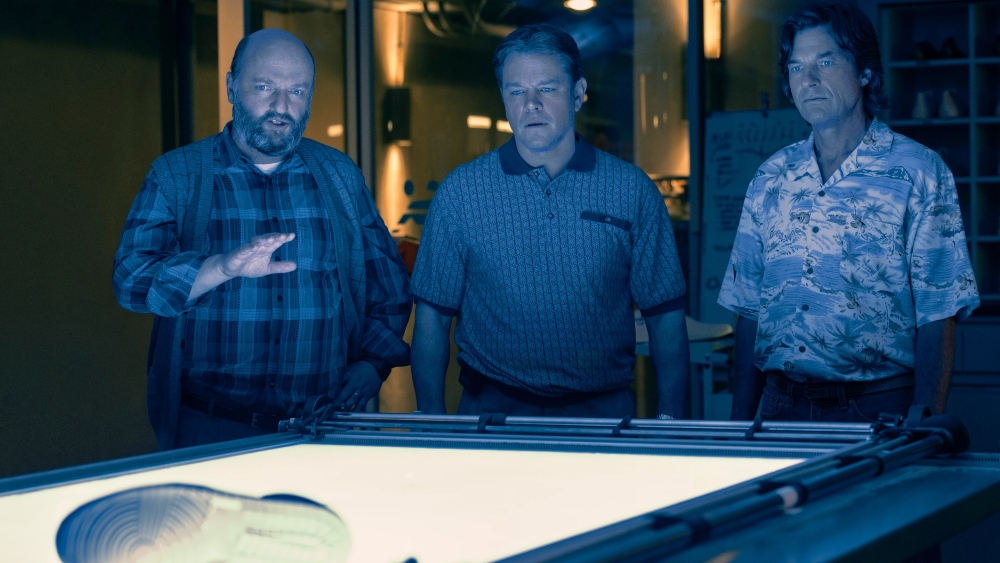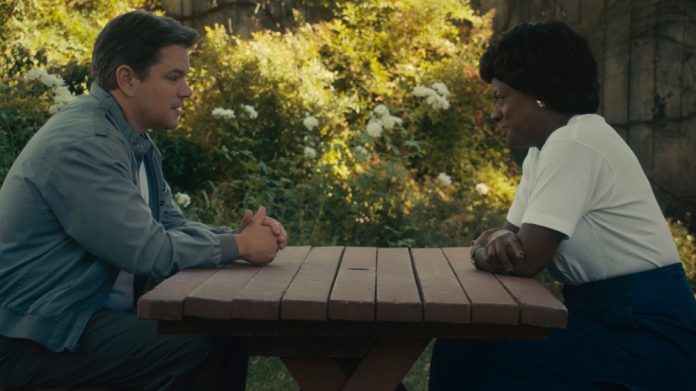Ben Affleck‘s entertaining, slightly facile new drama Air is not really about a shoe, nor is it about the athlete who made it famous. Of course, the film does feature the custom black-and-red high-tops that Nike presented to Michael Jordan back in 1984, when its executives bet big on signing the future NBA all-star to an endorsement deal that would ultimately revive their fading corporation and redefine athletic marketing. But “a shoe is just a shoe,” its characters agree, until Jordan steps into it — and given that most of those characters are colleagues at Nike, rather than basketball all-stars, they never even try it on.
Yet, Jordan is presented symbolically by Air as well, rather than as a main character or even an active participant in the sales pitch meetings that enabled Nike to hitch its wagon to his rising star, yielding many billions of dollars in profit for both parties. Only seen from behind and contributing just one line in a low mutter, the then-rookie might as well be God to the film’s real protagonists: the men of Nike determined to capitalize upon his court performance and build themselves a brand identity competitive with Adidas and Converse, where titans Larry Bird and Magic Johnson signed sponsorship deals of their own. That is to say, he’s money incarnate but still an abstract concept. One yearns for the version of this film that took an interest in Michael Jordan the athlete, rather than Michael Jordan the brand, though one could argue that’s Air‘s point: that, through their willingness to invest in the athlete as pure insignia, both Jordan and Nike became more extravagantly wealthy than either could have alone, demonstrating with massive dividends the overriding emptiness of capitalist gamesmanship.
And so it is that Air emerges as a companion to recent sports dramas like Moneyball and King Richard, which saw within larger stories of sports excellence additional triumphs of business acumen. It will be most inspiring to already-rich CEOs, board members, and employees of major corporations, wondering how they can transform their million-dollar businesses into billion-dollar enterprises. (At one point, the camera tilts from a Nike logo to show a Nike, Inc. logo below it.) As such, our hero is Nike executive Sonny Vaccaro, played by Matt Damon as a don’t-tell-me-the-odds-style true believer who predicted the value to be gained from signing Jordan back when few others did. In the film’s telling, this is because Sonny can identify greatness in even a single play, though his schlubby demeanor and adversarial relationship with Nike’s aphoristic CEO Phil Knight (a comical Affleck, in Zen-warrior mode behind his desk) more suggest an average joe taking one last shot at success before throwing in the towel. Either way, Nike needs a miracle; Sonny has only $250,000 to spend on a few players and keep its basketball division from closing; back then, Nike was better known for its running gear.

Committed to signing Jordan — then all but officially an Adidas man, especially according to his smarmy agent (Chris Messina) — Sonny goes rogue by traveling from Oregon to Jordan’s home in Wilmington, where he pleads his case directly to the athlete’s parents, Deloris (Viola Davis) and James (played by Davis’ actual, husband Julius Tennon). Skeptical of Sonny’s hard sell, Deloris nonetheless considers it, at which point Air starts to shift from the exclusively corporate to the slightly more human; arriving about halfway through the film’s runtime, Davis supplies a kind of serene gravitas unmatched by her co-stars, lending some much-needed dramatic substance to a film that elsewhere lacks it. Back then, athletes were never compensated by any of the mega-corporations that traded on their images, despite their success in the world of sports being the very definition of individual triumph. Air briefly becomes a much more intriguing film as Deloris negotiates for her son to receive a cut of the sales revenue, a condition unheard of at the time and that nearly stops the deal in its tracks.
Ultimately, though, everyone watching this film knows how it will end, and Affleck — working from a snappy script by Alex Convery — often seems uncertain how to make Air more than a craven tribute to high capitalism and its emissaries. (That Affleck reportedly took almost all of the notes given to him by Amazon perhaps explains the imbalance between multiple montages of ’80s ephemera and only a throwaway line about Nike’s exploitative labor practices.) Working with legendary cinematographer Robert Richardson, Affleck emphasizes everyday functionality in reproducing what office life must have been like in the ’80s, with Nike’s Beaverton offices providing a familiar floor of crowded desks, fax machines, and fluorescent ceiling lights. His nostalgia comes through — how else — in his adoration of brands that defined the era, from Rubik’s Cubes to ColecoVision, as well as the weird decision to close out the film with Bruce Springsteen‘s “Born in the USA,” a more loaded provocation in contemplating realities of the American dream than any Air is inclined to aim, shoot, or score.
There’s still pleasure to be found in watching all the Sorkin-ish dialogue get batted around by Damon and Affleck, both of whom have been playing these characters in their sleep for years. Their friendship and creative partnership now encompasses a production company, Artists Equity, that intends to secure better compensation for actors and production crews through an ownership participation scheme, and that context helps explain why Air treats its story of a business deal as one of aspirational triumph. But it grows wearying, after a time, to watch a film about how the rich became even richer, particularly one made by Amazon and styled even ironically as an underdog narrative. This is a solid exercise in brand mythology, putting the “commercial” in commercial filmmaking, but one with such a predestined outcome that all its Mad Men-esque wheeling and dealing can’t mask the sensation of all its characters running in place.
Grade: B-
Air had its world premiere at the SXSW Film Festival and is now playing exclusively in theaters nationwide courtesy of Amazon Studios.



